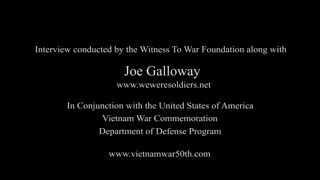2:50 | The locals were both Vietnamese and Montagnards. Larry Jordan had respect for both groups but he was disappointed at the way the Vietnamese treated the indigenous Degar people, known as Montagnards since the French era.
Keywords : Larry Jordan Vietnam Vietnamese Montagnard Degar Michelin Plantation Medical Civil Action Program (MEDCAP) Joe Galloway

After four years of ROTC and even more years of hearing his father and uncle argue over who had it worse in World War II, Larry Jordan secured an appointment to West Point. He was one of only nineteen minority cadets when he entered in 1964. After a thirty five year career, he retired as a Lt. General.
It was The Big Red One for Larry Jordan when he arrived in Vietnam. The West Pointer was assigned to a mechanized company in the 1st Infantry Division, where he lived out of an armored personnel carrier. When he was made reconnaissance platoon leader, he had more machine guns and some flametracks, vehicles which shot a stream of napalm.
At every level, says Larry Jordan, you have an officer teamed with a non-commissioned officer, and the officer is getting trained. He kept a good relationship with his men by not elevating himself. He recalls the time shared with men in Vietnam and a wary chaplain at his base camp.
"Good morning, Vietnam!" That was Larry Jordan's wake up call with the 1st Infantry Division in the field. When the entire division was ordered back to the United States, he still had time left on his tour so he wound up in the 1st Cavalry where he finished out his time.
Larry Jordan's mechanized unit was sent to relieve some men who were pinned down while attacking a North Vietnamese Army bunker complex. The mission was successful, but he saw things he never wanted to see again in the Army, especially the behavior of a certain captain.
For Larry Jordan, the most poignant memory of Vietnam was Christmas Eve 1969. In the field on an ambush, he wondered what he was doing hunting his fellow man on this holy day. In the dark quiet of night, an explosion rocked the jungle. Someone had triggered one of the trip wires.
The best day of his tour in Vietnam? That was the day Larry Jordan got the message that he had become a father. The worst day involved a pleasant young soldier who kept ignoring a basic safety precaution.
Some of the Forward Air Controllers in Vietnam were Australians and Larry Jordan laughs as he recalls one who came to visit just to see "what you guys do here on the ground." He shared a fire base with a Korean unit and was curious when he saw one of them laying on the ground at attention. Every time the old sergeant walked by, he would kick him.
Larry Jordan only talked with his wife a few times over his year in Vietnam. His son, who is in the modern Army in the age of instant communication, wonders how he dealt with that. When he returned home, he was told he might want to change into civilian clothes to avoid confrontation. He refused.
He knows men who are haunted by their Vietnam experience, but for a 23 year old 1st Lieutenant, it was an adventure. Larry Jordan went on to have a 35 year career in the Army and he applied lessons learned there.
What lessons from Vietnam do you have to pass on to future generations? Larry Jordan answers this in the context of today's conflicts. Then he reflects on the experience of visiting the Vietnam Veterans Memorial.